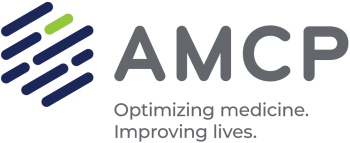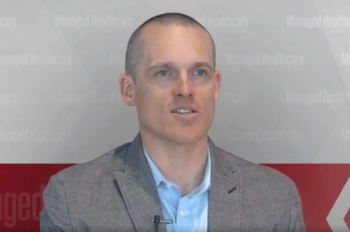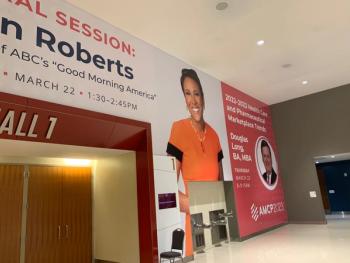
Adam Colborn outlined four trends in state-level action on pharmacy benefit managers (PBMs) and drugs in an interview prior to this presentation at the annual meeting of Academy of Managed Care Pharmacy (AMCP) today.

Adam Colborn outlined four trends in state-level action on pharmacy benefit managers (PBMs) and drugs in an interview prior to this presentation at the annual meeting of Academy of Managed Care Pharmacy (AMCP) today.

Panelists discussed reaching beyond large patient advocacy groups for input and how clinical trial endpoints may paint an incomplete picture of a drug's true value to patients.

Ross Margulies, J.D., M.P.H., a partner at the Foley Hoag law firm, discusses whether proposed transparency rules in the pharmacy benefit manager (PBM) legislation that Congress is considering might apply to the PBM-affiliated group purchasing organizations.

Ross Margulies, J.D., M.P.H., a partner at the Foley Hoag law firm, discusses proposals to “delink” what pharmacy benefit managers are paid from the price of drugs.

The pipeline for NASH treatments is robust, with six therapies in phase 3 development. Speakers at the annual AMCP meeting discuss Rezdiffra, the first drug approved specifically for NASH, and how to think about coverage issues.

According to the co-author of a poster presented at the annual AMCP meeting hosted in New Orleans this week, the interest in the study where the data was found stemmed from the prevalence of PPD in adults, especially women after giving birth.

Factors preventing biosimilar access include pharmacy benefit manager contracts and pharmacies not communicating with providers, a survey finds.

Ross Margulies, J.D., M.P.H., a partner at the Foley Hoag law firm, says there is broad agreement on transparency provisions and a ban on spread pricing in Medicaid.

The Access to Prescription Digital Therapeutics Act remains a top priority for the Academy of Managed Care Pharmacy (AMCP), according to Jennifer L. Mathieu, AMCP senior vice president of professional and government affairs.

Use of GLP-1 drugs and weight-loss care management programs need to focus on adherence and persistency for better health outcomes, suggests Prime Therapeutics/MagellanRx Management poster at AMCP 2024.

This week, the annual meeting of the Academy of Managed Care Pharmacy (AMCP) will bring 3,400 pharmacy, payers and industry leaders to New Orleans.

Managing Directors of L.E.K. Consulting, Joe Johnson, Todd Clark and Brendan Mitchell introduce the innovations happening in pharmacy, more specifically disruptive innovations, and how they affect managed care. The team explained some of the innovations to be on the lookout for in the future, also.

The Academy of Managed Care Pharmacy is throwing its support behind federal legislation that would create a Medicare benefit category for prescription digital therapeutics.

Yoona Kim, PharmD, PhD, co-founder, CEO of Arine Inc., talked about the relationship between racial health disparities and medication non-adherence, and how artificial intelligence can help improve adherence between groups most affected such as Black, Latino and Asian populations.

Specialty drugs are expected to comprise 80% of the FDA approvals this year. Among them are gene therapies for hemophilia A and Duchenne muscular dystrophy priced at between $2 million and $3 million.

Sharon Jhawar, Chief Pharmacy Officer at SCAN Health Plan, said the organization researched their health plans to figure out what inequities existed in their members. What stood out was that their quality was lower for Black members and they weren't meeting their needs. They also saw in medication adherence, a significantly lower percentage of their Hispanic and Black members who were non-adherent. With the help of AI and cultural matching patients with physicians, they have noticed the improvement of adherence from their patients.

Jane F. Barlow, MD, MPH, MBA, chief clinical officer of Real Endpoints led a presentation at the annual AMCP meeting that can help align payers and their manufactures for success in value-based contracting. In this interview Barlow gives some insight on where we are now with value-based contracting compared to a few years ago and if it's gained some traction or if there are challenges that remain. She also touched what therapies are prime candidates for value-based contracting.

Melissa Andel of CommonHealth Solutions spoke at the AMCP annual meeting today in San Antonio about the ins and outs of the Inflation Reduction Act. She shared her discussion highlights the Act's plans of cost shifting in healthcare and the Medicare part-D benefit re-design. In this interview with Managed Healthcare Executive, Andel addressed the Eli Lilly $35 Insulin cap and how plans of price negotiation will resonate with the public. She also expressed what we may expect through Congress when it comes to repealing any provisions through the IRA, and what could be coming through inflation penalty rebates.

Coverage decisions about prescription digital therapeutics may take payers out of their comfort zones and require new processes and subject matter experts, according to members of a panel at the AMCP annual meeting. But P&T committees are likely to still be central to the process.

They are the trendy way to lose weight and payers have been noticing an increase in GLP-1 claims. An analysis of the pharmacy and healthcare claims of a small commercial health plan in Texas documents the growth in the off-label usage of the GLP-1s, such as Ozempic, for weight loss.

Ben Urick, PharmD, PhD, Health Outcomes Research Principal at Prime Therapeutics, LLC, discussed how non-adherence to medication has lead to medical cost offsets and shared solutions to improve adherence from patients and providers. In particular, Urick shared best data-collecting practices that can in-turn improve both adherence and cost. Urick led a discussion on the challenges leading to non-adherence and shared the efforts underway to remove them at the annual AMCP meeting in San Antonio.

The IQVIA vice president sees trouble for generics manufacturers, but painted a bright picture for biosimilars during his keynote address at the annual meeting of the Academy of Managed Care Pharmacy (AMCP).

When asked for solutions in better managing expensive drug costs, Michelle Booth of Magellan suggests a "mortgage-like" payment that could help make these therapies, which are covered under medical benefits, more accessible and affordable. Because there aren't many gene therapies out there just yet in the market, there hasn't been much pressure in offering discounts through value-based contracts to patients. Though, more discussions on this initiative are happening, Andy Killpack also of Magellan, said in the second-part of a two part AMCP annual meeting video series.

Magellan's Michelle Booth and Andy Killpack presented today at the annual AMCP meeting in San Antonio to discuss equitable access to recombinant adeno-associated virus (rAAV) gene therapy as there are currently many barriers patients face toward treatment. Booth, senior director of specialty clinical solutions, claims though cost plays a significance in access, there are much more barriers from education to income that lead to inequities. Killpack and booth share solutions and other gene therapies expected to come to market.


At the annual AMCP meeting, Summit Re's Vice President of Actuarial & Underwriting, Rick Lassow, FSA, MAAA, led a discussion on managing high-cost medications through reinsurance and stop-loss programs. In this interview with Managed Healthcare Executive Lassow addresses high-cost cell and gene therapies ran through reinsurance and how Medicaid can benefit the most from reinsurance programs.

The co-anchor of Good Morning America spoke about her experience when she was diagnosed with myelodysplastic syndrome.

Costs have always figured into drug coverage decisions, but value assessments have become a separate and more formalized part of the process at payer organizations, said members of a panel on value frameworks at the 2023 AMCP annual meeting. The Institute for Clinical and Economic Review (ICER) came up often during the discussion.

A pavilion devoted to prescription digital therapeutics and an educational track devoted to biosimilars are new this year.

Kimberly Westrich, MA, Director of Value & Access Strategy at Xcenda/AmerisourceBergen kicks off AMCP's 2023 annual meeting in San Antonio with her discussion on value framework assessments. Westrich mentioned one of the obstacles payers come across when using value assessment frameworks in decision-making is either not having enough information or having the right kind of information.